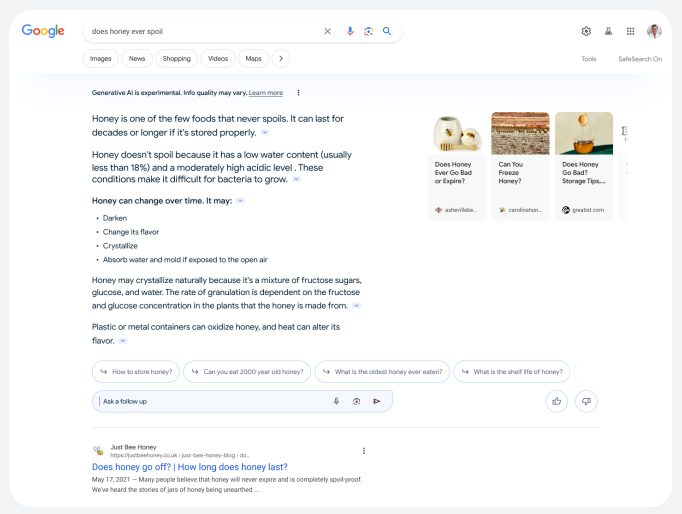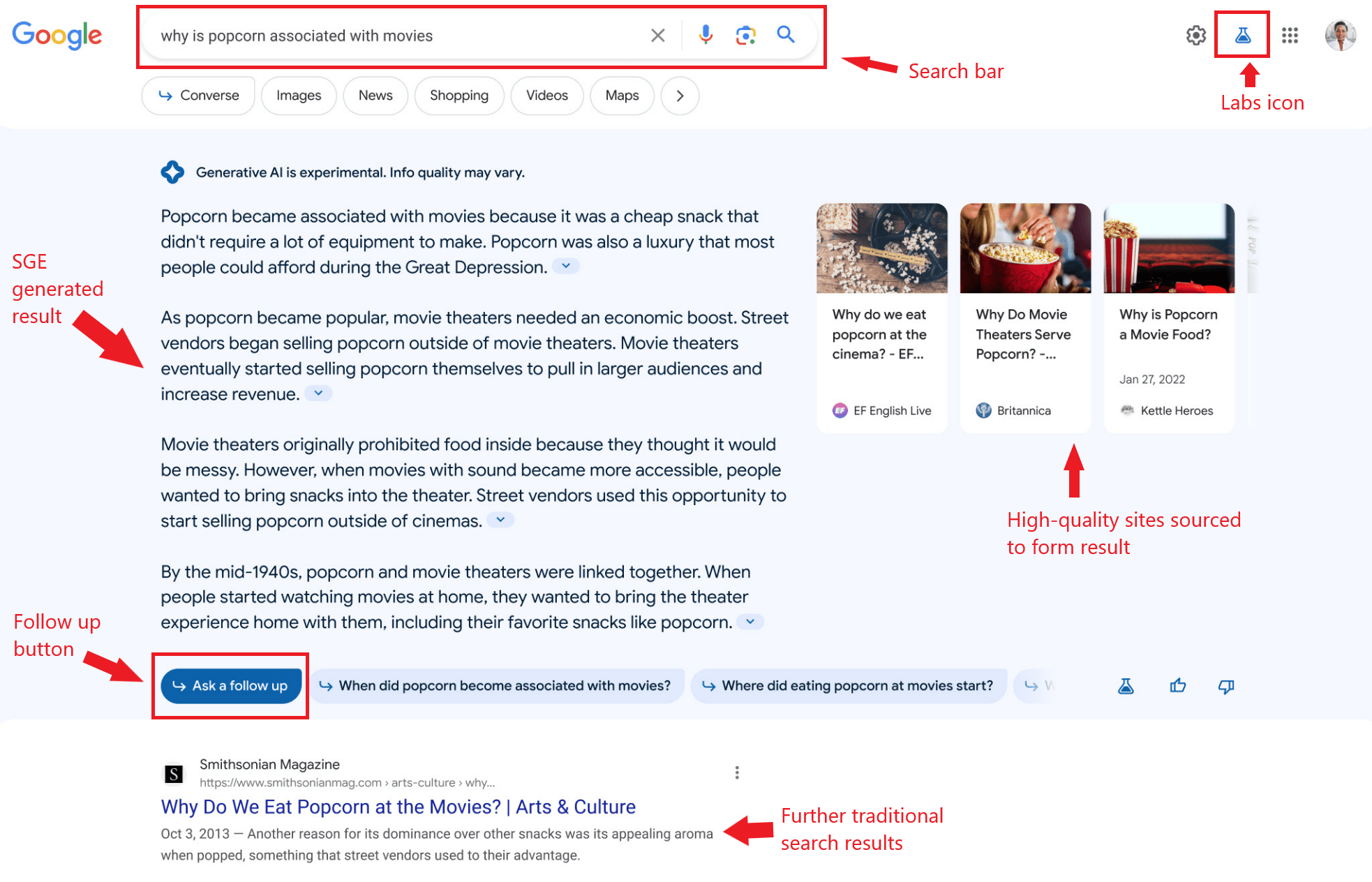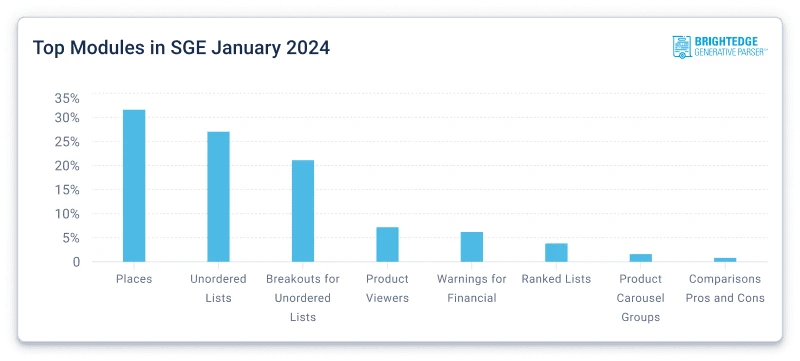Guide to Googles Search Generative Experience
Published: 9th August
A Complete Guide to Google’s Search Generative Experience (SGE)
Google’s Search Generative Experience (SGE) is set to revolutionise the way we search the web. Dive into what it is, how it works, and why it’s making waves.

Google’s Search Generative Experience (SGE) has been anticipated for some time and has undergone extensive testing, but it is now officially available to the public. SGE represents Google’s initiative to integrate AI into search results, offering users AI-generated responses tailored to their queries.
Whether you’re looking for a particular recipe, the top attractions in a city, or guidance on fixing a cupboard door, SGE can provide relevant answers right at the top of your search results. After multiple iterations and updates, Google rolled out SGE to users in the United States in May 2024. However, this feature is currently limited to the US and has not yet been launched in the UK. The primary goal of SGE is to leverage cutting-edge generative AI technology to reshape search results, deliver concise overviews on search engine result pages (SERPs), and streamline online browsing.
Essentially, SGE aims to provide comprehensive answers to user queries directly within the SERP, reducing the need to click through to external sites for information. The introduction of SGE is already making waves in the realm of organic search, fundamentally altering the search landscape. While organic traffic and SEO will remain crucial for businesses, SGE introduces new dynamics that we have yet to fully understand, particularly in the UK market.
This development poses both challenges and opportunities, and many factors surrounding its impact are still unclear. In light of these changes, our team at Falcon Digital has conducted an in-depth analysis of SGE: what it is, how it operates, and what we can expect in the near future. We’re also exploring how businesses can adjust their marketing strategies to effectively leverage the influence of this new tool. Let’s delve into the details of the Search Generative Experience, how it functions, and why it’s generating so much buzz in the industry.
WHAT EXACTLY IS SEARCH GENERATIVE EXPERIENCE?
In Google’s words, “SGE is an early step in transforming the search experience with generative AI. When using SGE, people will notice their search results page has familiar web results organised in a new way to help them get more from a single search.
With generative AI in search, people can:
Ask new questions that are more complex and descriptive.
Get the gist of a topic faster, with links to relevant results to explore further.
Get started on something you need to do quickly, like writing drafts or generating imagery right from where you’re searching.
Make progress easily by asking conversational follow-ups or trying suggested next steps.”
Essentially, with Google SGE, users can access quick overviews of search topics, conveniently displayed at the top of search engine result pages. These summaries help users identify relevant portions of web pages and explore new ways to phrase their queries, much like ChatGPT, Bing Chat, or Bard.
See the screenshot below to understand what this looks like in situ:

For example, where previously you may have typed a question into Google and then clicked on the most relevant result to get your answer, now SGE will in essence crawl the web to pull together the most accurate and relevant information to answer your question. This is demonstrated in the screenshot above.
A Brief SGE History
As a basic overview, SGE has evolved through Google’s REALM, RETRO, and RARR models, making use of language models and relevant documents to provide accurate and informative search results.
To dive deeper into the topic of how SGE works, this article from Search Engine Land contains the most detailed explanation: https://searchengineland.com/how-search-generative-experience-works-and-why-retrieval-augmented-generation-is-our-future-433393
To sum it up, Google unveiled the Search Generative Experience (SGE) in August 2020, kicking off with the introduction of the “Retrieval-Augmented Language Model Pre-Training” (REALM).
REALM enhances information retrieval by pinpointing and extracting significant data from entire documents, achieving greater accuracy than conventional language models.
Building on this foundation, Google’s DeepMind team developed the “Retrieval-Enhanced Transformer” (RETRO), which boasts improved context understanding and produces more coherent text compared to REALM.
They also created “Retrofit Attribution using Research and Revision” (RARR), which focuses on refining existing text rather than generating it from the ground up, aiming for both accuracy and informativeness, though it may come with higher computational demands.
SGE integrates the PaLM 2 and MuM language models with Google Search features, utilising the document index and Knowledge Vault to enhance response quality.
All these developments culminated in 2024, when Google officially made SGE available to the public.

How Does Search Generative Experience Work?
There are multiple aspects of SGE that contribute to its workings and how it displays information for the user. These include:
AI Snapshot
When suitable, SGE will present an AI-generated overview to give users a quick insight into a topic, highlighting key considerations and useful details. These overviews act as a springboard for users to delve into a variety of content and viewpoints available online.
Additionally, SGE will provide links to resources that back up the information in the overview, allowing users to verify the details and explore more deeply.
Follow-up Questions
SGE streamlines search results to align more closely with user inquiries, resulting in a search experience that’s better tailored to individual needs. Users have the option to “ask a follow-up,” allowing them to fine-tune their search or delve into a modified version of their query without needing to repeat the context.
Additionally, tapping on suggested next steps can lead to relevant information or questions users might not have initially considered, encouraging further exploration. This process generates a refreshed summary that includes new insights and additional links to resources for users to investigate.
Vertical Experiences
SGE can craft informative paths for inquiries related to topics like shopping or local searches, which often involve various perspectives to examine. For instance, in the realm of shopping, SGE assists users in finding essential product details, streamlining their purchasing decisions.
When it comes to product searches, SGE highlights important considerations and presents a variety of options. Additionally, SGE offers product descriptions that feature current reviews, ratings, prices, and images, ensuring users have all the information they need at their fingertips.
Are there any limitations to the search-generative experience?
According to Google, “Generative AI and large language models (LLMs) have their limitations, and even now, Search may not always deliver accurate results. We are approaching the integration of new generative AI features into Search with caution and care. Our models are designed to meet the high standards of quality that users expect, and we will continue to enhance them over time.
They are built on our foundational systems that we’ve been refining for years, and we’ve implemented extra safeguards, such as restricting the kinds of queries that can trigger these capabilities.” Here are some significant limitations to consider:
Misinterpretation during corroboration
Sometimes, SGE finds information that supports its snapshot, but it misreads the wording, resulting in a different interpretation of the output.
Hallucination
As with any experience that relies on large language models, SGE can occasionally present inaccurate information or misinterpret insights.
Bias
SGE’s training relies on premium web data that it has gathered, which can sometimes result in limited portrayals of individuals or create unfavourable contextual links. This issue is prevalent in current search results as well. Take, for instance, a general search about sports; the results often skew towards men’s athletes and teams, even when information about women’s teams or players might be just as relevant, if not more so.
Opinionated content implies a persona.
Although SGE aims to maintain a neutral and objective tone in its responses, there are times when its output may inadvertently echo prevailing opinions found online, which can give the impression that SGE has its own viewpoint or personality.
Duplication or contradiction with existing search features
Since SGE is part of the regular search experience, it can sometimes clash with other information displayed on the search results page. Additionally, Google has yet to share any concrete data regarding whether AI-generated answers are influencing website clicks, click-through rates, or the effectiveness of ads on what we refer to as CHERPs, or Chat Engine Results Pages. This lack of information poses a major obstacle when trying to analyse SGE performance.
We Still Need to Be Cautious About Using SGE
Although SGE offers certain benefits, it’s evident that it requires significant refinement to deliver more precise results for users. Since its introduction, there have been some amusing, yet concerning, instances of misinformation, such as the suggestion to put glue on pizza to keep the cheese in place or the bizarre recommendation to consume one rock daily for good health (who would have thought!).
While these anecdotes may elicit a laugh, they also highlight a serious issue regarding the accuracy of the information provided. For instance, one response to the question “how to cope with depression” suggested “jumping off the Golden Gate Bridge,” which is not only wrong but also poses a serious risk to individuals seeking help. Unfortunately, due to the nature of LLMs, such alarming responses are more prevalent than one might expect.
It’s important to recognise that all LLM models can produce incorrect information. The examples mentioned underscore the need for ongoing improvements to ensure that the information shared is sourced from credible, relevant, and safe references.
How will SGE change search? Measuring the impact
The emergence of generative AI is transforming the landscape of SEO. So, how does this shift affect conventional strategies for retrieving information through both paid and organic avenues? The Search Generative Experience (SGE) is set to have a significant impact on organic search outcomes, bringing both advantages and challenges as Google works to enhance the speed, depth, and ease of online searches.
This evolution will inevitably alter various metrics we rely on to gauge organic performance, such as keyword rankings, click-through rates (CTR), total clicks, impressions, sessions, and more. For instance, SGE currently excels at addressing long-tail queries and specific questions. Some experts estimate that this could lead to a drastic 50–90% decline in CTR for long-tail keywords. In tests conducted in January 2024, prior to the full rollout of AI capabilities, Brightedge compiled data on the types of search results being generated.

When it comes to transactional and navigational searches, the initial impact seems to be minimal. If users are looking for a particular product, service, or business, SGE is less likely to deliver an AI-generated response at this stage. In the search engine results pages (SERPs), SGE’s summaries take up considerable screen space, often necessitating extra scrolling on mobile devices, which could adversely affect the CTR of traditional organic listings. This underscores the potential advantage of appearing in SGE’s overview section.
Additionally, results from SGE are displayed as links or cards on the right side of the screen. Moreover, the ‘follow-up’ section at the bottom of SGE results, when utilised, further diminishes the visibility of organic listings in the SERPs.
How to Prepare for SGE
While SGE is reshaping how we approach search and will likely keep influencing it for a while, there are already effective strategies to boost your visibility. This can help you not only compete for SGE results but also improve your chances in traditional organic search. Here are some key suggestions from Falcon Digital:
Context and Relevance
While SGE has changed the landscape, crafting optimised SEO content remains crucial. However, the stakes are higher now. It’s essential to align your content with the details found in the overview box. A deeper understanding of user search intent is more important than ever; your content should not only target specific keywords but also address the underlying reasons behind a user’s search. Aim for engaging, relevant material that directly answers their questions.
Don’t forget the tried-and-true SEO practices, like using eye-catching images, carefully chosen titles, well-structured content, effective internal linking, and an organised layout. These elements can significantly improve your chances of success.
User Engagement
In today’s digital landscape, creating content that captures user engagement is more crucial than ever. It’s not enough for content to simply address a user’s question; it should also inspire them to take further steps—whether that means exploring related articles, completing a specific action, or progressing through a purchasing process.
Engaging content demonstrates its value and relevance effectively. This approach can significantly enhance engagement rates and overall performance. Moreover, if your content shows up in SGE-generated results, it’s vital to make it as compelling as possible to boost your chances of conversions.
E-E-A-T is still key
The transition to Search Generative Experience (SGE), coupled with the launch of the October 2023 Spam Update and the ongoing Helpful Content Update, underscores a notable change in how Google values content that meets its E-A-T standards (experience, expertise, authority, and trust).
Creating authoritative, relevant, and topical content remains crucial. Following E-E-A-T principles is essential not only for improving potential SGE results but also for optimising traditional search performance.
Citations and Coverage
It’s well established that backlinks play a crucial role in how well a site performs organically. When your site receives links from reputable and authoritative sources, it benefits not only from the direct value of those links but also from the credibility and recognition they bring. It’s important to remember that your reputation isn’t just about your own words; it’s also shaped by what others say about you.
This connects to the concept of Google’s E-E-A-T. By showcasing your business as credible and trustworthy within your sector through mentions, citations, and quality links, you can enhance your search performance and improve your chances of ranking well, especially in results generated by Search Generative Experience (SGE).
What lies ahead when it comes to SGE?
That’s an interesting question, and it turns out that answering it is more complex than it might seem at first glance. Google’s goal of organising information underpins the development of SGE (Search Generative Experience). As users become accustomed to these innovative features, we can expect search queries to become longer and more conversational, which could affect the click-through rates of the traditional ten blue links. The recent collaboration between Google and Reddit has already begun to transform search results and SGE.
We’re noticing that answers from Reddit are increasingly appearing in SGE outputs as well as traditional search results. This partnership clearly indicates Google’s intention to take a more active role in shaping search outcomes. Moreover, it’s likely that advertisements will also find their way into SGE, helping to sustain Google’s revenue and encouraging businesses to invest more to enhance their visibility.
As for the SGE itself, being fundamentally an iteration of a large language model, it will continually adapt and improve. Google is likely to invest significant time and resources into refining its responses, and as we’ve observed, there’s still some fine-tuning needed!
How Falcon Digital Can Help Guide Your Business Through SGE
Navigating SGE—its workings, potential effects, and optimisation strategies—can be quite challenging, especially when juggling various marketing demands. At Falcon Digital Solutions, we’re here to steer your business through the constantly evolving landscape of SGE. With our seasoned team, we bring years of expertise in search optimisation, always keeping pace with the latest trends.
We’re already assisting businesses in preparing for SGE by emphasising key areas like E-E-A-T, citations, coverage, and user engagement, all while adhering to proven SEO practices. Our goal is to ensure our clients are well-equipped to leverage SGE when it launches in the UK.
We understand the importance of being prepared, which is why we’ve established streamlined processes and workflows designed to implement effective optimisations and unlock new opportunities for growth. Reach out to learn how we can support your business in enhancing its search and SGE strategies.







Email [email protected]
Phone 01392 908804
Office Hours
9am - 5pm Mon-Fri
Office Address
Falcon Digital, Office 6, 6 St Paul's Road, Newton Abbot, Devon, TQ12 2HP
Other Services
Company Registration no:
13682575
VAT Registration Number:
GB 437 7229 74

